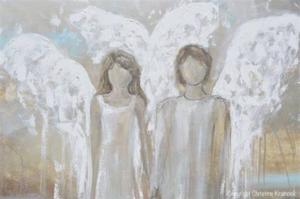I sit and wait
Does an angel contemplate my fate?
And do they know
The places where we go
When we’re grey and old…
Man, I really wanted to write about angels this week. I’ve been in love with them since I was a child, when I used to write them letters about everything, and I still cry when Proginoskes, ‘a singular cherubim’…well, read A Wind in the Door by Madeleine L’Engle. I gleefully call 29 September (St Michael and the Archangels) to 2 October (Guardian Angels) the angel corridor, and I was really looking forward to playing with it in this Dark Devotional.
Until, that is, I looked at the readings for Sunday and put my head in my hands. Had they been almost anything else, I might have gotten away with it, but to ignore these most difficult readings would look like cowardice, I think, so here we go.
As an Enneagram 8, it’s my habit to grab the bull by the horns, so let’s hit the thorniest issue first: “one man, one woman”—Amy-Jill Levine takes that apart far better than I ever could here. She talks about how not even self-proclaimed literalists take everything in the Bible literally, otherwise they’d be chopping off the hands of sinners. For example, our second reading tells us that anyone who marries a divorced woman commits adultery, yet Catholics are almost the only Christians who strictly abide by that, while giving way on other things. Levine also discusses the need to read and interpret in context, of the culture and their understanding of nature at the time. That makes sense to me: how can you look at a constantly unfolding creation, yet believe that revelation is frozen in time? That mindset is truly contra naturam.
Suffice it to say, my stance is that revelation with regard to human sexuality is unfolding just as creation perpetually unfolds. So, if you’re adults entering a relationship with full knowledge and full consent, oodles of love, and know you want a ceremony of commitment – you should have the right to the sacrament of marriage. The vocation of marriage is to be a sign of G-d’s love to the world, to demonstrate the loving relationship we see in the Trinity, and to sanctify each other in that relationship – in any combination of consenting adult humans possible.
As passionately as I support non-heterosexual marriage, I’m going to leave it there – because as a straight cis-woman, this is not my story to tell. It is only for me to come alongside, lift up LGBTQIA+ voices, raise my privileged voice when no one will listen to theirs, and fight for them however I can.
So I’m going to move on to what I feel I can address, beginning with my ambivalence about our first reading, Genesis 2: 18-24. On one hand, it’s so obviously a ploy to entrench the patriarchy. In Genesis 1, we are told:
So God created humanity in his image, in the image of G-d He created it; male and female he created them.
That translation by Dr Raanan Eichler, different from the usual Christian Bible translation – in the image of G-d He created him – gives us pause for thought. If it, which then becomes male and female, is made in the image of G-d, then men and women are equally charged with stewardship of creation.
I’m guessing the author of Genesis 2 was unimpressed by that implication and thought, ‘You know what, I’ll rewrite this and no one will notice.’ Really, dude? You thought we wouldn’t notice that G-d created all the other species in numbers and then just created…one in His image? Second, you thought we wouldn’t notice the timing was off? In Genesis 1, G-d creates everything else first and man last, but here, you’re trying to tell us this omniscient, omnipotent Maker creates all these animals for Adam’s pleasure, thinking he’ll find a helpmate from creatures without a frontal lobe and language? “Oh yeah, that jellyfish will work out fine, I’m sure we’ll be able to problem solve beautifully together.” In other news, Satan will be hosting the 2022 Winter Olympics. That’s all before we even get to the narcissistic rib fib that makes woman an extension of man, rather than her own person created from earth.
This at last is bone from my bones,
and flesh from my flesh!
This is to be called woman,
for this was taken from man.
Is it any wonder men think they’re entitled to women’s bodies? Sling your hook, mate.
On the other hand, despite that hot mess, there are some things worth noting here. First of all, the term ezer kenegdo, as both Eichler and Professor Tamara Cohn Eskenazi explain, is not about being Adam’s inferior assistant, the Robin to his Batman, as implied by most Christian Bible translations. They both point out that wherever ezer kenegdo is used in the Bible, almost always for G-d, it means something much more profound: deliverer, rescuer, lifesaver. Today, we may be leery of those descriptions, imagining they imply a co-dependent relationship, but ezer/ezrah (feminine) kenegdo is about true partnership.
Then we come to the word cleave, which we’ve come to associate almost exclusively with marriage and its consummation. Not so fast — Amy-Jill Levine points out this is the same verb used for Ruth and Naomi. So this directive really can’t be about one man and one woman, or consummation which is meant to produce progeny. The moment I read that, I reached the same conclusion Levine stated at the end of her paragraph: this is about creating a new family.
For someone who grew up in a deeply difficult family of origin, this interpretation opens up new worlds. On my Instagram, I often use the hashtag #FamilyOfTheHeart to refer to my friends, who are the family I’ve chosen — the people who have been there through laughter and tears; who stayed when my wounding emerged in the ugliest of ways: lashing out, withdrawal, doing everything I could to prevent them from getting close. But like the best of families, they stayed because they saw and believed in something, a goodness, in me belied by my behaviour.
These are the people who have been ezer/ezrah kenegdo – true partners and helpers, even lifesavers – supporting, challenging, holding the space, helping me to unfold into the person G-d dreamt I would be when He created me. I hope and pray I do the same for them.
It is in the context of my #FamilyOfTheHeart and so many others (many families of origin, many not), that Jesus’ advice in the gospel rings true for me: what G-d hath put together, let no man put asunder. When it gets hard, it’s so easy to want a get (writ of divorce) and walk away. That doesn’t mean we stay in abusive or manipulative relationships: we get out, often with the help of our friends. But it does mean that we stay for the hard healing work that happens at our growing edge with our ezer/ezrah kenegdo, deadheading that which has wilted, making room for new life, so that we, like Jesus, may, ‘because of the suffering of death, be crowned with glory and splendour.’
In the end, what these passages tell us is that it is not good for us to be alone; our ruggedly individualistic culture will kill us. We are made for relationship, made to help one another, one friendship linking with another to form a #FamilyOfTheHeart that connects outwards in ever-increasing circles, until we are a global sanctuary, with no one excluded, a place where all may flourish.
And looking around, it looks like the little children – Malala Yousafzai, Greta Thunberg, Marley Dias – will lead us. Perhaps it’s time we became more like them, so we may all come together to create and finally enter the kingdom of heaven.
Huh. Maybe I ended up writing about angels after all.
When I’m feeling weak
And my pain walks down a one way street
I look above
And I know I’ll always be blessed with love
And as the feeling grows
She breathes flesh to my bones
And when love is dead
I’m loving angels instead
Irim Sarwar is an American of IndoPak ancestry now living in the UK who was born Muslim and became Catholic via teaching at a Modern Orthodox Jewish school. She has also catalogued books in a Dominican priory, worked in quality assurance, and is currently a churchwarden and freelance copyeditor/proofreader. Spiritual mongrel. Believes in hybrid vigour in all things, especially journeys of faith.













